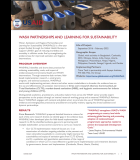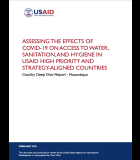Tuberculosis CARE1 (TB CARE1 Program )
Challenge TB (CTB) is a five year global United States Agency for International Development (USAID)- funded project implemented by the CTB partnership with KNCV Tuberculosis Foundation (KNCV) as the prime. The project builds and expands upon previous USAID tuberculosis (TB) prevention and treatment efforts. As the lead partner for the CTB project in Mozambique, FHI 360 provides technical leadership to the project, ensuring coordination, management and monitoring of the project activities at the country level. FHI 360 maintains a close working relationship with the National Tuberculosis Program (NTP), USAID, other relevant departments of the Mozambique Ministry of Health (MOH), KNCV, the only other CTB coalition partner, and other collaborating partners, including civil society organizations, to ensure project activities are implemented in line with the NTP national strategic plan 2014–2018, and in accordance with established standards
Activity Description
The project is implemented in 4 provinces (Nampula, Zambezia, Tete and Sofala) covering 64 districts: all districts in three provinces of Nampula, Tete and Sofala and 13 of the 22 districts in Zambezia province. The provinces were identified by the NTP based on defined priorities (population size, disease burden, and as a direct response to the USAID mission prioritization process targeting provinces to receive USG funding. Approximately 56% of the country’s population live in the CTB provinces. In implementing CB-DOTS activities, eight subawards have been signed with national/international organizations; ADPP in 17 districts of Nampula (7) and Zambezia (10) provinces, Damien Foundation (DFB) in 22 districts of Tete (15) and Sofala (7) provinces, ComuSanas in 6 districts of Sofala province, OLIPA-ODES is 8 districts of Nampula and the Provincial Directorate of Health (DPS) in 3 districts of Zambezia province.
Expected Outcomes
The Challenge TB partners operate using a framework which has four strategies:
• Engage stakeholders, including national TB programs, new partners and individuals, and especially youth.
• Empower key decision-makers, people affected by TB, and marginalized and vulnerable populations.
• Evaluate interventions, measure quality, develop evidence, and implement best practices.
• Expand on the provider and service range, and remove barriers to access.





